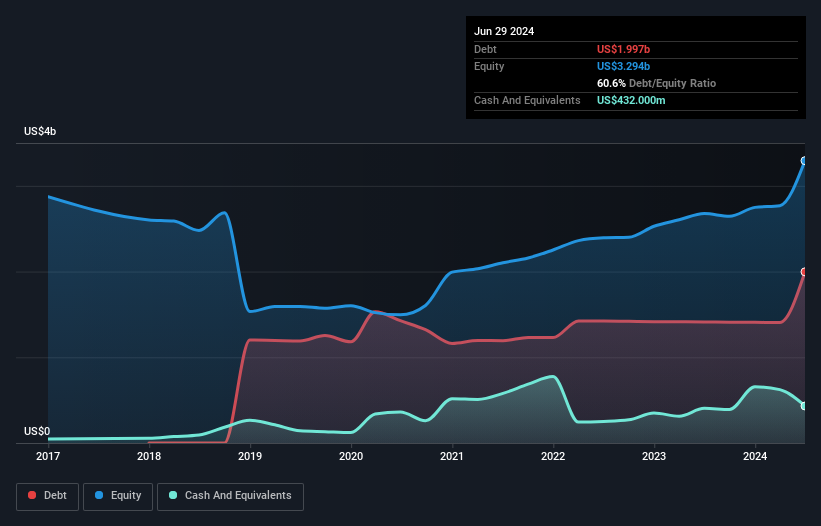Here's Why Resideo Technologies (NYSE:REZI) Has A Meaningful Debt Burden
Warren Buffett famously said, 'Volatility is far from synonymous with risk.' So it might be obvious that you need to consider debt, when you think about how risky any given stock is, because too much debt can sink a company. We can see that Resideo Technologies, Inc. (NYSE:REZI) does use debt in its business. But should shareholders be worried about its use of debt?
What Risk Does Debt Bring?
Debt assists a business until the business has trouble paying it off, either with new capital or with free cash flow. If things get really bad, the lenders can take control of the business. While that is not too common, we often do see indebted companies permanently diluting shareholders because lenders force them to raise capital at a distressed price. Of course, debt can be an important tool in businesses, particularly capital heavy businesses. When we examine debt levels, we first consider both cash and debt levels, together.
See our latest analysis for Resideo Technologies
What Is Resideo Technologies's Net Debt?
You can click the graphic below for the historical numbers, but it shows that as of June 2024 Resideo Technologies had US$2.00b of debt, an increase on US$1.41b, over one year. However, it does have US$432.0m in cash offsetting this, leading to net debt of about US$1.57b.

How Strong Is Resideo Technologies' Balance Sheet?
Zooming in on the latest balance sheet data, we can see that Resideo Technologies had liabilities of US$1.59b due within 12 months and liabilities of US$3.10b due beyond that. Offsetting these obligations, it had cash of US$432.0m as well as receivables valued at US$1.07b due within 12 months. So it has liabilities totalling US$3.19b more than its cash and near-term receivables, combined.
Given this deficit is actually higher than the company's market capitalization of US$3.13b, we think shareholders really should watch Resideo Technologies's debt levels, like a parent watching their child ride a bike for the first time. Hypothetically, extremely heavy dilution would be required if the company were forced to pay down its liabilities by raising capital at the current share price.
We use two main ratios to inform us about debt levels relative to earnings. The first is net debt divided by earnings before interest, tax, depreciation, and amortization (EBITDA), while the second is how many times its earnings before interest and tax (EBIT) covers its interest expense (or its interest cover, for short). This way, we consider both the absolute quantum of the debt, as well as the interest rates paid on it.
With a debt to EBITDA ratio of 2.3, Resideo Technologies uses debt artfully but responsibly. And the fact that its trailing twelve months of EBIT was 9.7 times its interest expenses harmonizes with that theme. Sadly, Resideo Technologies's EBIT actually dropped 8.3% in the last year. If earnings continue on that decline then managing that debt will be difficult like delivering hot soup on a unicycle. There's no doubt that we learn most about debt from the balance sheet. But ultimately the future profitability of the business will decide if Resideo Technologies can strengthen its balance sheet over time. So if you want to see what the professionals think, you might find this free report on analyst profit forecasts to be interesting.
Finally, a company can only pay off debt with cold hard cash, not accounting profits. So it's worth checking how much of that EBIT is backed by free cash flow. In the last three years, Resideo Technologies's free cash flow amounted to 35% of its EBIT, less than we'd expect. That's not great, when it comes to paying down debt.
Our View
To be frank both Resideo Technologies's EBIT growth rate and its track record of staying on top of its total liabilities make us rather uncomfortable with its debt levels. But on the bright side, its interest cover is a good sign, and makes us more optimistic. Once we consider all the factors above, together, it seems to us that Resideo Technologies's debt is making it a bit risky. That's not necessarily a bad thing, but we'd generally feel more comfortable with less leverage. The balance sheet is clearly the area to focus on when you are analysing debt. However, not all investment risk resides within the balance sheet - far from it. We've identified 2 warning signs with Resideo Technologies , and understanding them should be part of your investment process.
If, after all that, you're more interested in a fast growing company with a rock-solid balance sheet, then check out our list of net cash growth stocks without delay.
Have feedback on this article? Concerned about the content? Get in touch with us directly. Alternatively, email editorial-team (at) simplywallst.com.
This article by Simply Wall St is general in nature. We provide commentary based on historical data and analyst forecasts only using an unbiased methodology and our articles are not intended to be financial advice. It does not constitute a recommendation to buy or sell any stock, and does not take account of your objectives, or your financial situation. We aim to bring you long-term focused analysis driven by fundamental data. Note that our analysis may not factor in the latest price-sensitive company announcements or qualitative material. Simply Wall St has no position in any stocks mentioned.
 Index Options
Index Options CME Group
CME Group Nasdaq
Nasdaq Cboe
Cboe TradingView
TradingView Wall Street Journal
Wall Street Journal